I Dig Sports
Men's NCAA tournament: Live updates, highlights, reactions and more
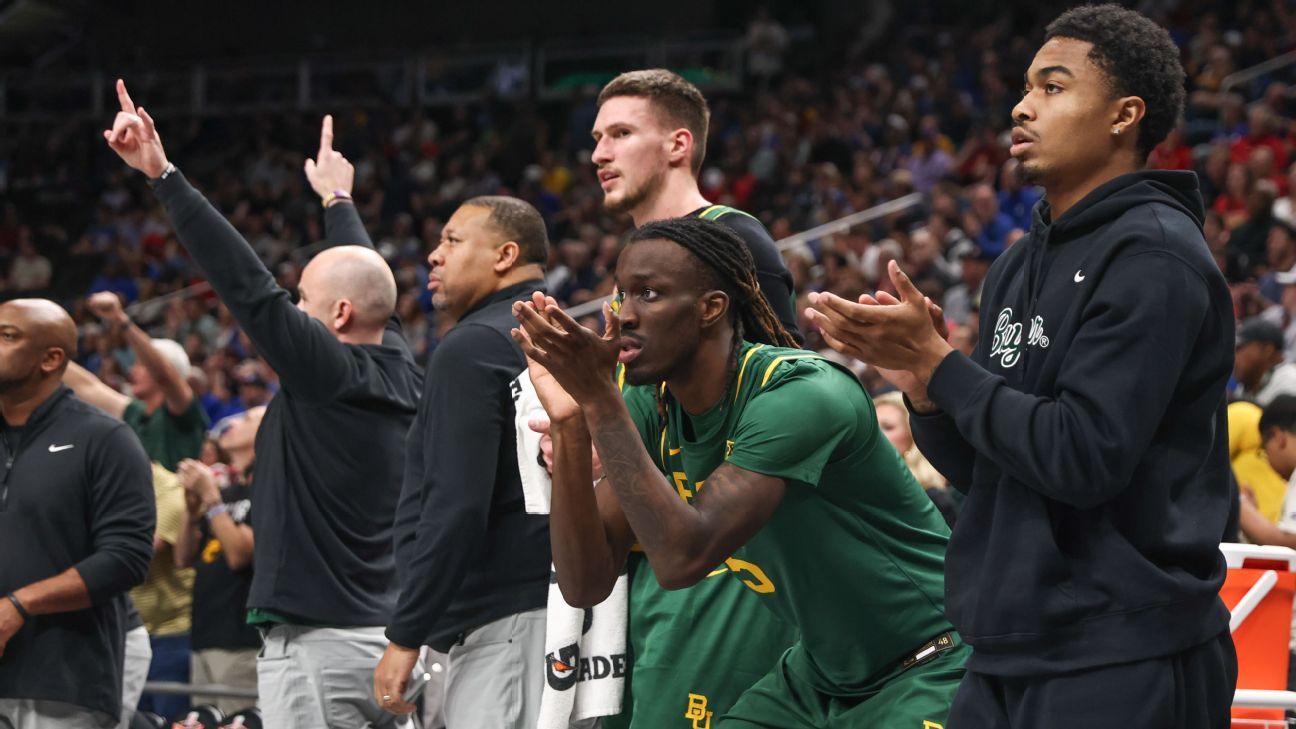
After an exciting Day 1 in the NCAA tournament, 32 more teams are in action Friday.
The games tip off at 12:15 p.m. ET, and we've got a full 12 (or more!) hours of hoops in store, including the NCAA tournament debut of Duke superstar Cooper Flagg, returning from an ankle injury that kept him out of two games in the ACC tournament. And can North Carolina keep up the momentum from its big First Four win with an upset of Ole Miss?
Whether you're watching all 16 first-round games or refreshing score pages, consider this your guide to all the major highlights and results, along with reactions and on-site reporting from ESPN writers across the country.
Jump to: Full schedule | Live updates
No. 14 Lipscomb vs. No. 3 Iowa State, 1:30 p.m. (TNT)
No. 12 Colorado State vs. No. 5 Memphis, 2 p.m. (TBS)
No. 16 Mount St. Mary's vs. No. 1 Duke, 2:50 p.m. (CBS)
No. 10 Vanderbilt vs. No. 7 Saint Mary's, 3:15 p.m. (truTV)
No. 11 North Carolina vs. No. 6 Ole Miss, 4:05 p.m. (TNT)
No. 13 Grand Canyon vs. No. 4 Maryland, 4:35 p.m. (TBS)
No. 16 Norfolk State vs. No. 1 Florida, 6:50 p.m. (TNT)
No. 14 Troy vs. No. 3 Kentucky, 7:10 p.m. (CBS)
No. 10 New Mexico vs. No. 7 Marquette, 7:25 p.m. (TBS)
No. 13 Akron vs. No. 4 Arizona, 7:35 p.m. (truTV)
No. 9 Oklahoma vs. No. 8 UConn, 9:25 p.m. (TNT)
No. 11 Xavier vs. No. 6 Illinois, 9:45 p.m. (CBS)
No. 15 Bryant vs. No. 2 Michigan State, 10 p.m. (TBS)
No. 12 Liberty vs. No. 5 Oregon, 10:10 p.m. (truTV)
Bronny has season-high 17 points in Lakers' loss
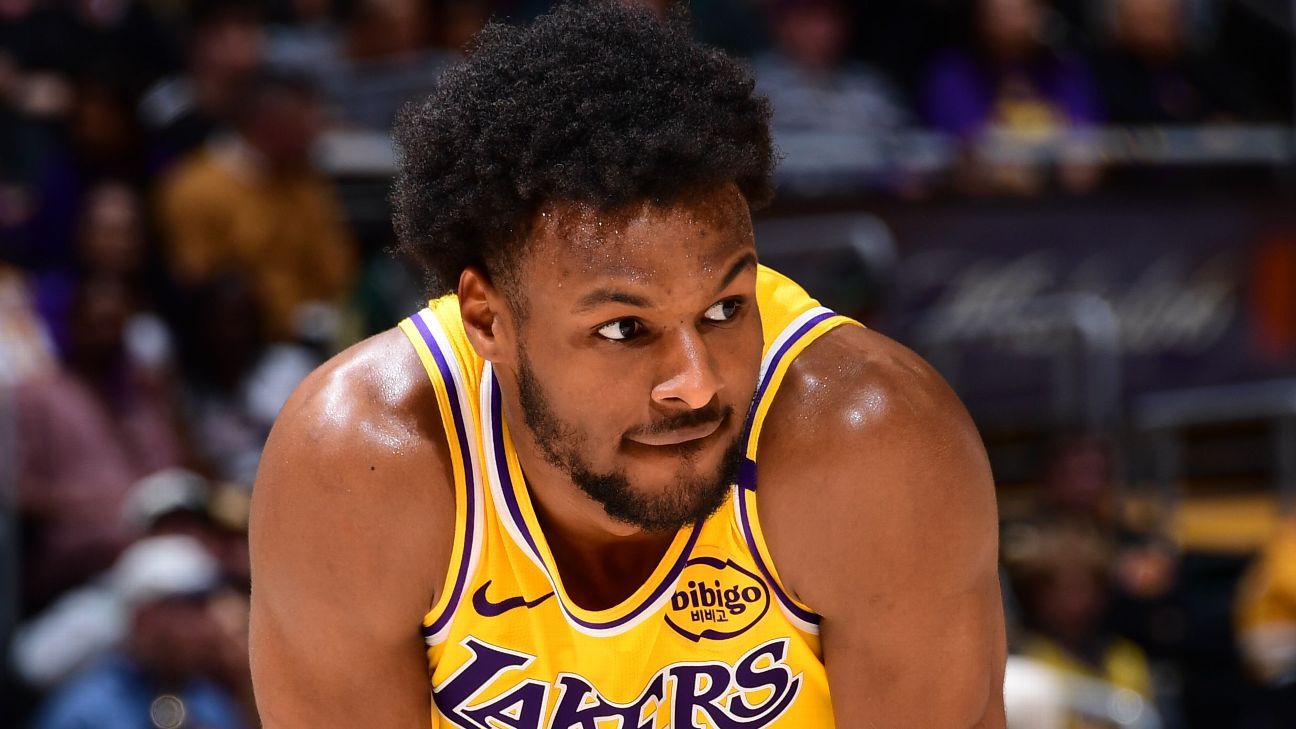
LOS ANGELES -- Raucous chats of "Bronny! Bronny!" have been a regular occurrence late in Lakers home games, as the crowds at Crypto.com Arena pine to see rookie Bronny James play in garbage time.
Lakers coach JJ Redick -- with nearly half his roster out because of injuries as Los Angeles completed its sixth game in eight days -- didn't need any cajoling from the fans to put James in during the Lakers' 118-89 loss to the Milwaukee Bucks on Thursday.
Rather than cheering James on as a sideshow, the Lakers guard took center stage, going one-on-one against two-time MVP Giannis Antetokounmpo in the first half.
Dribbling the ball beyond the arc with Antetokounmpo guarding him in front of the Lakers bench where his father, LeBron James, sat in street clothes, Bronny James crossed over left to right behind his back and then back right to left on the Bucks star as "oohs" and "ahhs" filled the arena.
The play finished with James losing the ball out of bounds -- but only after he had driven into the paint past Antetokounmpo, with the Bucks star grabbing him and no whistle from the referee.
"He's a much bigger guy than me," the 6-foot-3 James said of the 6-11 Antetokounmpo. "So I just got to find a way to get around him somehow. May have got fouled. That's up for argument, but it is what it is.
"I tried to get me a bucket."
That sequence might have resulted in a turnover, but he turned the playing opportunity into a career night, scoring a season-high 17 points on 7-for-10 shooting and adding five assists, three rebounds and a block in 30 minutes of playing time.
"Not surprised by tonight," Redick said of James. "I think his confidence is growing. ... I think the next step is just becoming an elite-conditioned athlete. Because when [he] does that, with his physical tools and his burst and his handle -- and we think he's going to be an above-average to really good NBA shooter -- he's going to have a chance to really make an impact."
Selected with the No. 55 pick after a lone season at USC, James' rookie season up until Thursday didn't include many highlights. He averaged 1.6 points on 26.3% shooting (22.7% from 3) in 4.7 minutes per game through 21 appearances before Thursday.
He fared much better for the South Bay Lakers, L.A.'s G League affiliate, however. With South Bay, he has averaged 20.6 points on 43.1% shooting (36.1% from 3), 5.0 rebounds, 5.1 assists and 1.8 steals in 33.5 minutes per game across nine contests.
Despite that production -- significant given his age (20) and draft position -- he has been a lightning rod for criticism.
"I've just been impressed with the person that he is," Redick said. "And to deal with ... frankly, bulls--- because of who his dad is and just keep a level head about it and be a class act says a lot about him, says a lot about that family. And the way LeBron and Savannah have raised him was obvious to me from the moment I started spending time with him on the court this summer. He was certainly going to be an NBA player, and I still believe that he'll be an NBA player."
Bronny James said Redick and the rest of the coaching staff's faith in him has helped him settle at the pro level after his collegiate career was compromised when he suffered a cardiac arrest.
"Just all the coaches believing in me and continue to put that in my head that they believe in me and what I can do as a player," James said. "I was given an opportunity tonight to go show them what I've been working on while I've been sitting on the bench, in the G League getting reps, stuff like that. Just constantly putting that in my head that they believe in me and that I can contribute."
With a year and a half passed since the heart incident, James said he is beginning to trust his body more, too.
"I feel like it's all coming back," he said. "Just being out for that long, stuff that I had to go through, wind-wise and lung-wise ... I think I've been getting more comfortable as I get the reps under me and get the games under me and practices and learning from the bench and stuff like that. And I feel like it's good for me."
James said he has focused on the "controllables" by consistently working as hard as he can to shield himself from the outside scrutiny that comes with being the son of the league's all-time leading scorer.
And he will continue with the same approach, now that he has a little more to show for that work after his performance against the Bucks.
"Going in the gym tomorrow, ready to work as hard as I did yesterday," he said. "Same approach for every day with my job."
Pelicans' Williamson (back) out vs. Timberwolves

New Orleans Pelicans forward Zion Williamson has been downgraded to out for Friday's game against the Minnesota Timberwolves in Minneapolis.
Williamson, who is dealing with a low back contusion, scored 29 points on 12-for-16 shooting in the Pelicans' 119-115 win over the Timberwolves on Wednesday.
The two-time All-Star has played in just 30 games (all starts) this season, averaging 24.6 points, 7.2 rebounds and 5.3 assists.
New Orleans selected Williamson with the top overall pick in the 2019 NBA Draft. His time with the Pelicans has been marked by multiple injuries, starting with a torn meniscus during the preseason of his rookie year.
Williamson, 24, has played in just 214 games (all starts) over five seasons, missing the entire 2021-22 campaign. He has averaged 24.7 points, 6.6 rebounds and 4.3 assists.
From All-Star to architect: How Buster Posey plans to rebuild the Giants
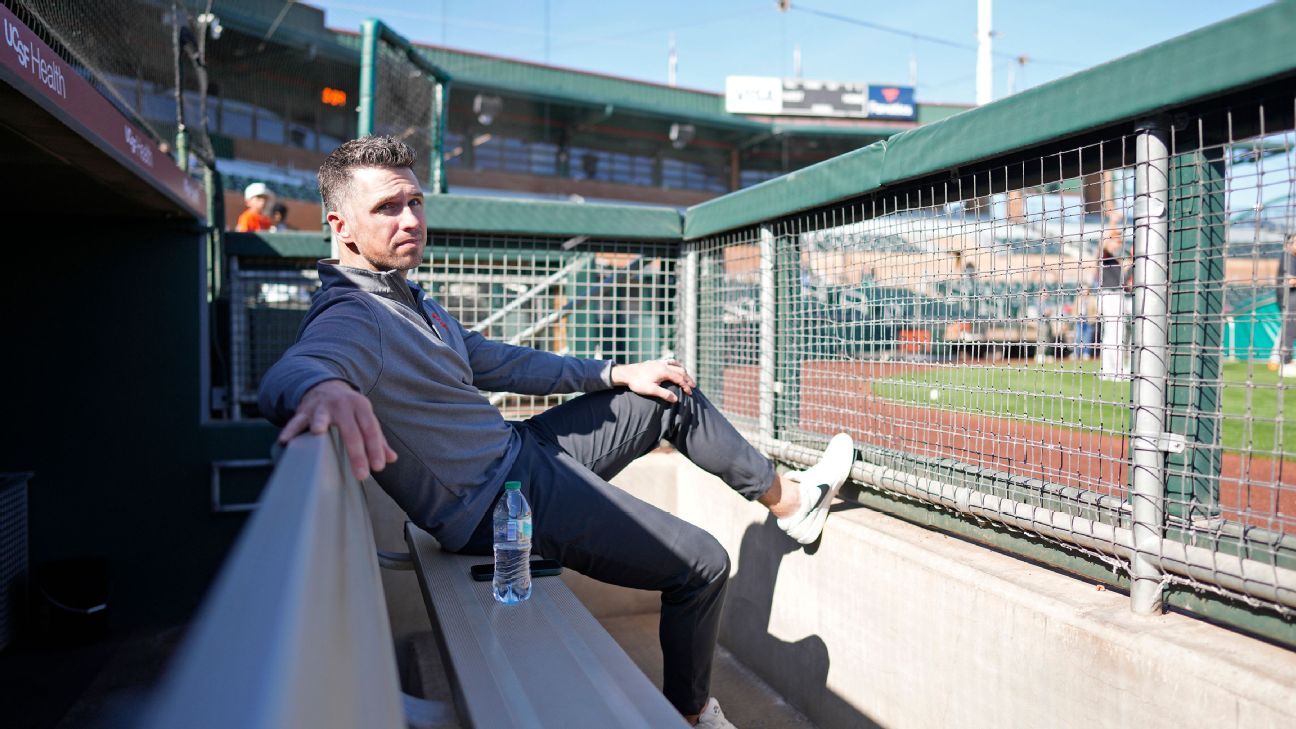
SCOTTSDALE, Ariz. -- Buster Posey's spring training office, at one corner of a sprawling indoor facility attached to Scottsdale Stadium, is nondescript and mostly barren, save for some apparel boxes that have stacked up behind his desk. The walls are noticeably empty, devoid of mementos from a catching career that included an MVP, a Gold Glove and five Silver Sluggers. The only hint that one of the most celebrated players in San Francisco Giants history now occupies a space reserved for the head of baseball operations is a nameplate outside the door.
Posey, six days shy of his 38th birthday and less than six months removed from accepting a job few people of his stature have ever taken on, spent a dozen years trying to will the Giants to victory. Now, he has a different role: to methodically guide them there, inch by inch, meeting by meeting, transaction by transaction.
It has required some letting go.
"As a player, I would come in every day and have a list in my mind of what I wanted to accomplish, whether it was in the weight room or hitting or catching, and now, in this role, I think the best way to describe it is -- it's kind of a lack of control, as much as anything," Posey said. "Because you had the ability as a player to directly impact outcomes, and now the impact is trying to create a roster of guys that have the same mentality and want to go out and try to win a lot of baseball games."
That, essentially, is the goal. Posey was at the center of World Series titles in 2010, 2012 and 2014, but the Giants have made the playoffs only twice since. Under Farhan Zaidi, the man Posey replaced as president of baseball operations in September, the Giants didn't win enough games and didn't make enough strides to justify the losses. Also, according to many of those who know the organization intimately, the Giants seemed to lack identity, allure, soul.
Posey is striving to change that. He wants to build the Giants into a consistent, sustained winner, just like Zaidi attempted to do over the past six years, but he also wants them to be fun. He wants to deviate from the analytical roster-building approach that has overtaken the industry, prioritizing hyper-efficiency and placing less emphasis on aptitude and experience. He wants to construct indelible Giants teams the community can rally around, the way it used to for most of the previous decade.
Posey has often said that people in his position are in the "memory-making business," a nod to his belief that these aren't just baseball teams they're overseeing, but civic institutions.
His playing career taught him that.
"I've met fans before that genuinely feel like they know me, just because of how much baseball is on TV," Posey said. "That's something that's important to me. I want our fan base to have that connection with our players. I'm hopeful that the 10-year-old out there is pulling on his or her mom's coattail and saying, 'I want to go in because I want to see Player X-Y-Z today.' They want to go buy the jerseys. So yeah, it is about winning. First and foremost, it's about winning. But I think the stories make the winning even better."
Posey, who retired three seasons ago, will be eligible for the Hall of Fame beginning in 2027. Given the recent induction of Joe Mauer, another standout catcher who didn't accumulate the aggregate numbers of a traditional Hall of Famer but made up for it with a dominant peak, there's a good chance he'll be enshrined in Cooperstown then. He'd do so on the heels of a playing career that saw him earn more than $150 million, which makes one wonder why Posey would willingly take on such a demanding job.
To him, it's simple: He feels a responsibility to the Giants, and he continues to possess this unrelenting desire to test himself.
"It's a challenge, and it's hard to turn down a challenge," Posey said. "You want to see, 'Is it something that I can do?' 'Is it something that I'm going to like doing?' 'Is it something that I'm going to be good at?' There's obviously questions. You're like, 'I don't know, am I going to be good at this?' It's not the same as playing baseball. It's different."
POSEY ADDRESSED THE Giants before their first full-squad workout Feb. 17, stressing the importance of fundamentals and the power of cohesion. He is still trying to figure out how to balance interacting with players and maintaining a healthy distance from the clubhouse, as most front-facing executives tend to.
"I want to be available, I want them to know I care, I want them to know that I'm watching -- but I don't want to overstep, either," Posey said. "There are going to be tough conversations, inevitably, at some point. I hope to operate, in a way, as transparent as I can with them. There's certain things that you're not going to say just because they don't need to be said; they're irrelevant at some point. And there's going to be times, I know, when players will be frustrated. But my intent is going to be whatever is best for the San Francisco Giants, and hopefully that will come through."
Posey isn't too far removed from being one of them. After opting out of the COVID-19-shortened 2020 season to stay with his wife, Kristen, while they cared for an adopted set of premature twin girls, Posey came back in 2021, made his seventh All-Star team, then promptly retired.
Patrick Bailey, the Giants' current catcher, was a 22-year-old finishing his first full season of professional baseball then. He chuckled when asked if he thought Posey would be running the baseball-operations department within three years.
"Nah," he said. "I figured he'd still be playing."
Posey initially returned to his home state of Georgia to begin a new chapter in his life. It lasted about a year. In September 2022, he joined the Giants' ownership group and also formed part of a six-person board of directors, a role that included participating in meetings about payroll configuration and providing input on player acquisitions.
Posey also became involved in high-profile recruiting efforts, most notably around Shohei Ohtani, whose signing with the rival Los Angeles Dodgers in December 2023 -- the continuation of a trend that had seen other stars like Aaron Judge and Bryce Harper sign elsewhere -- prompted Posey to voice his concern that negative perceptions about San Francisco were hurting their chances. Nine months later, when the Giants were working to lock up Matt Chapman, Posey invited the All-Star third baseman to his home, added a no-trade clause, eliminated deferrals and helped finalize a six-year, $151 million extension.
Posey can't recall a specific moment that prompted him to pursue this job but said his "wheels started turning a little bit" while serving on the board.
"I thought that one day it might be something fun to try," he added. "I didn't think it'd be as quick."
Other members of the Giants' ownership group initially thought about having Posey serve as an assistant within Zaidi's baseball-operations department, chairman Greg Johnson told ESPN. "But the more we went down that path, the more we realized that that could create more tension and uncertainty in the clubhouse having those two heads there, and that really got us to the point of talking directly to Buster about doing it.
"My feeling was he was a little hesitant at first," Johnson added, "and I think we were a little hesitant. I think we kind of felt like the perfect scenario would be maybe a couple more years down the road, but timing doesn't always work out that way."
The more the two sides spoke, the more Posey seemed to warm up to the idea. Kristen's support solidified his decision.
"I'm very lucky to have such a supportive wife because I went from basically being a full-time man-ny to now having a full-time job," Posey said. "It's been an adjustment at home."
Posey has another set of twins, a boy and a girl, who are 13 now, old enough to possess vivid memories of their father as a star baseball player. The younger pair are just 4. Part of the reason he took this on was because he wanted his children to see him working. He felt it would be important for them to witness the value of structure and sacrifice. But he probably could have accomplished that with one of the cush special-assistant jobs bestowed upon distinguished former players.
It didn't have to be this.
"I think he's crazy," said Zack Minasian, the Giants' general manager and Posey's new right-hand man, with a laugh. "But he said this to me once before: 'You got to be a little psycho to be a catcher, and maybe you got to be a little psycho to run baseball operations.'"
A MONTH INTO Posey's time in the job, baseball's elite gathered in San Antonio for the general managers meetings. On the first night, at a cocktail hour at one of the bars inside the JW Marriott, Minasian joked that Posey should wear his name tag.
"Really?" Posey said.
"No," Minasian told him. "Everyone knows who you are."
Minasian had spent the past 20 years working in baseball operations, 14 of them with the Milwaukee Brewers. He's familiar with the dynamics between the 30 front offices -- the cliques that form, the relationships that are built, the fraternizing that often takes place, even among rival staffs. But he wondered how Posey was experiencing it for the first time. At one point he leaned over and asked if any of this was surprising. Posey's response was telling: "Shouldn't we want to kill them?"
Posey has long been considered a natural leader -- so much so that his longtime agent and current adviser, Jeff Berry, has not so jokingly suggested he could be president -- and a calming presence. But within him also lies a relentless competitor. During his playing days, it was constantly in plain view. Now, that part of him comes out more subtly.
Minasian has noticed it in the aggression that will spill out of him if a meeting doesn't go a certain way, or in how direct he'll get when on the phone with another agent.
"It's like watching him play," Minasian said. "It's a slow burn -- calm, cool, under control, but then it burns extremely hot."
Before this offseason, Posey had never directly negotiated with an agent or worked out a trade with another executive. He didn't know the collective bargaining agreement intimately, had probably a surface-level understanding of other teams' farm systems and wasn't well-schooled in the infinite minutiae of roster management. Ambition will only take him so far. But those who knew him during his playing days are quick to point out other attributes that might ease the transition.
Stephen Vogt, the Cleveland Guardians manager who once served as Posey's backup, called him "the smartest player on the field." Toronto Blue Jays starter Kevin Gausman, a former Giant, called Posey "one of my favorite teammates," noting his attention to detail but also how easy he was to talk to. Chris Young, the longtime pitcher who is now the Texas Rangers' president of baseball operations, thinks Posey will be a good delegator, a crucial trait while overseeing such a massive enterprise.
"I don't doubt he'll have his moments when he struggles with it," Young said, "but Buster is so thoughtful and humble and caring, and those qualities will take him a long way."
Four months into his tenure, Posey's first major trade saw the father of two sets of twins break up another set of twins, sending reliever Taylor Rogers to the Cincinnati Reds. His first major free agent signing saw him break his own franchise record for largest contract -- one Posey didn't know he still held.
Ten days into December, the Giants signed veteran shortstop Willy Adames to a seven-year, $182 million deal, addressing their biggest need with the best available player to fill it. They did so by acting aggressively, landing Adames before Juan Soto chose his next team and the other finalists could pivot. Money is what probably made the difference, as is often the case, but Adames was swayed by Posey's authenticity.
"He was straightforward -- that he doesn't want to basically ruin his legacy as a winner now that he's in a front office, and that obviously he took this job sooner than he expected and he's not going to do that to just come over here and be another guy," Adames recalled. "And I believe that."
The rest of the offseason developed slowly. Pursuits of Garrett Crochet, Corbin Burnes and Roki Sasaki, frontline starters who could have bolstered a rotation that accumulated the fewest innings in the National League last season, didn't materialize, prompting Posey and Minasian to take a chance on 42-year-old Justin Verlander. Trade proposals for arbitration-eligible players like Camilo Doval, LaMonte Wade Jr. and Mike Yastrzemski never made enough sense to pull the trigger.
Given that they were basically doing this for the first time, Minasian could sense that other front offices were "feeling us out," trying to determine how they're wired.
Posey, he believes, could sense it too.
"As a competitor," Minasian said, "I think he had a lot of fun with that."
POSEY IS ONE of only five heads of baseball operations who played in the major leagues, along with the Rangers' Young, Craig Breslow of the Boston Red Sox, Chris Getz of the Chicago White Sox and Jerry Dipoto of the Seattle Mariners.
Over these first few months, Posey has leaned heavily on Young, who pitched in the big leagues from 2004 to 2017. His best advice, though Posey isn't sure if he borrowed it from someone else, was that baseball is composed solely of two entities: the players on the field and the fans in the stands.
"The rest of us," Young told him, "are just hanging on."
Posey is trying to keep that front of mind.
"This isn't about me," he said. "This is ultimately about the guys on the field and how they play. I think that's really a big piece of this to me, is for them to understand -- 'If this works well, it's because you're playing well.' There's only so much you can do."
Young, 45, admittedly still struggles with relinquishing that control. As a player, he said, "I knew what I needed to do to help the team succeed, and it was about me taking care of myself. I was not solely focused, but I was focused solely internally. In this role, it's about everything externally facing him. It's about on a daily basis helping others and empowering people and choosing the right people. And it's about everybody else."
Posey has left a lot of the logistics to Giants assistant GM Jeremy Shelley, who has been with the organization for more than 30 years. Minasian has also carried a major load.
During his extensive time as a pro-scouting director, Minasian took pride in being able to play GM for 29 other teams, accumulating foundational knowledge on the types of players they valued and what they tried to leverage. Through that, he also built the kind of relationships with agents and executives that Posey is only beginning to carve out. Minasian had most of the initial conversations over the offseason, and Posey would usually take over near the end, which speaks to what might be one of his most valuable traits.
Posey's presence, some believe, should help the Giants lure free agents.
"I mean, you have [Verlander] and me already," Adames said. "And now we're going to change the culture, and we're going to put the message out there that this is different now. We're trying to build something great; we're trying to build greatness here. And now with him running things to go recruit, it'll be awesome. Because if you talk to players, and they don't like who's running the team, they don't like what they're doing in the organization -- a free agent guy's not going to come here.
"But now that you do things differently here -- and he's trying to do something great -- of course the word's going to come out like that. Guys are going to think differently about San Francisco now."
The Giants share a division with the Dodgers, who look especially dominant these days. The San Diego Padres and the Arizona Diamondbacks also project to be better this season. The Giants need some of their promising young starting pitchers to blossom. They need their offense to become more menacing. And they need to revitalize a farm system that ranks 29th heading into the season, according to ESPN's Kiley McDaniel, largely because of recent graduations but also because the Giants have not capitalized enough on first-round picks.
Success, then, could take a while. But Posey has seemingly been drawn to the process. He spent the offseason coming into the offices as often as possible to get familiar with names and faces and found himself talking to a lot of intelligent people who often shared unique ideas. They energized him. And through that, Posey began to experience a different type of satisfaction.
"I've always loved baseball," he said. "Since I was little, I love playing it. But I guess what I have learned just in these first four or five months is that it's a different type of enjoyment, being involved this way, but there's still a lot of passion there on my end."
POSEY'S MOTHER-IN-LAW DIDN'T want him to take this job at first. She was worried about how it might tarnish his pristine image with the Giants' fan base, which, given the fraught nature of making so many high-level decisions in what amounts to a game of chance, doesn't seem unreasonable. But Posey isn't letting his mind go there.
"I guess I'm not worried about it just because ultimately I know, my family knows, people close to me know, that I'm going to do this to the best of my ability, and I'll care about any decision that I make and every conversation that I have," he said. "I'm really hopeful that it's successful. But if it's not, life goes on. It'll be OK."
Posey wants a front office group that is unafraid of how outsiders might react to certain transactions, and he wants his players to "be themselves."
He also wants the Giants to get back to basics.
Advanced metrics are now ingrained in the fabric of every team, but it's clear that Posey, more so than most of his peers, wants to blend them with some of the concepts that were valued when he played and are generally now dismissed as old-school philosophies.
Posey thinks RBIs matter. He values the off-field benefits of having veteran players in a clubhouse, speaks about the importance of "using the scoreboard to teach us how to act during a game" -- tightening the strike zone when the score is close, not taking an extra base with a big lead -- and wants the Giants to develop "complete baseball players" rather than focusing on measurables.
His GM (Minasian) comes from a scouting background. His two advisers are an agent who has loudly spoken out about baseball becoming too analytically inclined (Berry) and a longtime executive who made a name for himself in a different era (Bobby Evans). One of the men tasked with running the Giants' player-development program (Randy Winn) is an ex-teammate whose post-playing career had been more geared toward coaching.
Early in his tenure, Posey announced he would move the analytics office out of the front of the clubhouse, a decision that was seen mostly as symbolic. For spring training, he invited a host of former Giants players to serve as guest instructors, a rarity under Zaidi.
"We're in the day and age of analytics, and he's a little bit more of a traditional thinker," Giants manager Bob Melvin said. "His instincts really were part of who he was as a player."
Greg Johnson believes there was "tension between the old-school model and the new-school analytics" under Zaidi, adding: "There was some noise coming from the clubhouse that maybe we didn't have the right balance."
Reached by phone, Zaidi, who has since returned to the Dodgers as an adviser, said he never got that impression. Zaidi said he maintained an open-door policy for players to talk about the organization's process and continually spoke with Melvin to ensure they weren't operating in either extremity.
"Through that channel, I got positive feedback," Zaidi added. "When you postmortem things, maybe you have a different lens on it, but it was something that I was very conscious of, throughout my time with the Giants and particularly last year."
Posey's focus is not so much on doing things different from Zaidi, he said, but on forging a new identity. Minasian stressed that the Giants will seek a "healthy balance" between new-school and old-school philosophies, and some of the early signs -- ordering two Trajekt pitching machines over the offseason, keeping the research-and-development staff intact after lead analyst Michael Schwartze left for the Atlanta Braves -- show that numbers will still matter.
But they won't mean everything, and that in itself feels different.
In his talks with Posey, Verlander found it refreshing to communicate with a decision-maker who valued qualities the analytics could not measure. Whether that will actually yield better results is an open question, one that has been roundly debated for years, but Verlander is hopeful.
"I think it could very much be something that can lead to having a better organization," Verlander said. "It's like me pitching and probably him hitting and catching towards the end of his career -- you were brought up in an age before analytics, and so you have this wealth of instinct. And this is why it's hard to put words on it because you have all these instincts that you gained over time from playing the game, and then all of a sudden you're inundated with numbers.
"I think the best players were able to go, 'OK, I see this, I see this,' and put them all together, and you get something magical, really. And if he's able to do that as a president, as a person bringing in players, there's potential for something that's just magical."
Djokovic 'does not agree' with parts of union's lawsuit
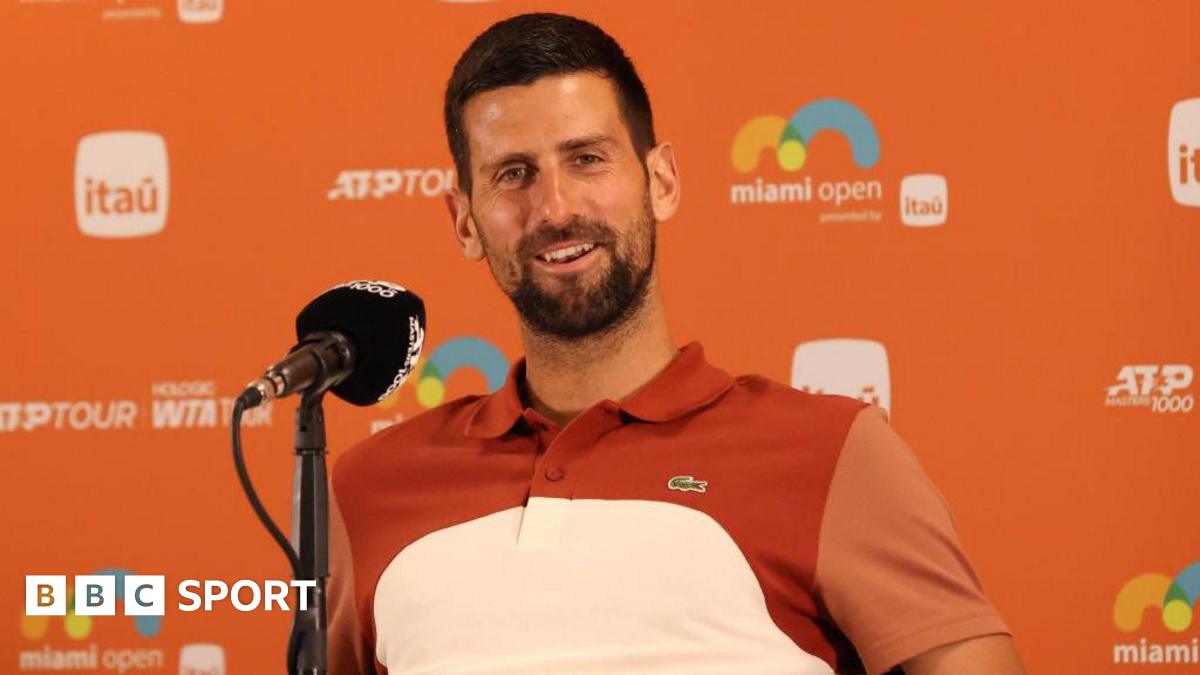
Record 24-time Grand Slam winner Djokovic co-founded the PTPA in 2020 with Canadian Vasek Pospisil, but he is not among the 12 players as plaintiffs alongside the PTPA.
"In general, I felt like I don't need to sign the letter because I want other players to step up. I've been very active in tennis politics," Djokovic said at the Miami Open on Thursday.
"This is a classic lawsuit, so lawyers to lawyers, type of situation. So to be quite frank with you, there are things that I agree with in the lawsuit, and then there are also things that I don't agree with.
"And I found that maybe some wording was quite strong in there, but I guess the legal team knows what they are doing and what kind of terminology they're supposed to use in order to get the right effect."
Djokovic insisted he does not want to cause a rift in tennis despite his union taking action.
"I've never been a fan and supporter of division in our sport, but I've always fought for better representation and influence of and positioning of the players globally in our sport, which I think is still not where I think it should be and where most of the players think it should be," he added.
"Not just in terms of prize money, but in terms of many other points that have been also stated in that document."
Both the ATP and the WTA Tour have defended their record, pointing to the prize money and security they offer players.
On Wednesday world number three Carlos Alcaraz said he did not support the legal action, partly because he was not informed that he would be quoted in the lawsuit.
'Stress and pressure' ended Raducanu coach link-up
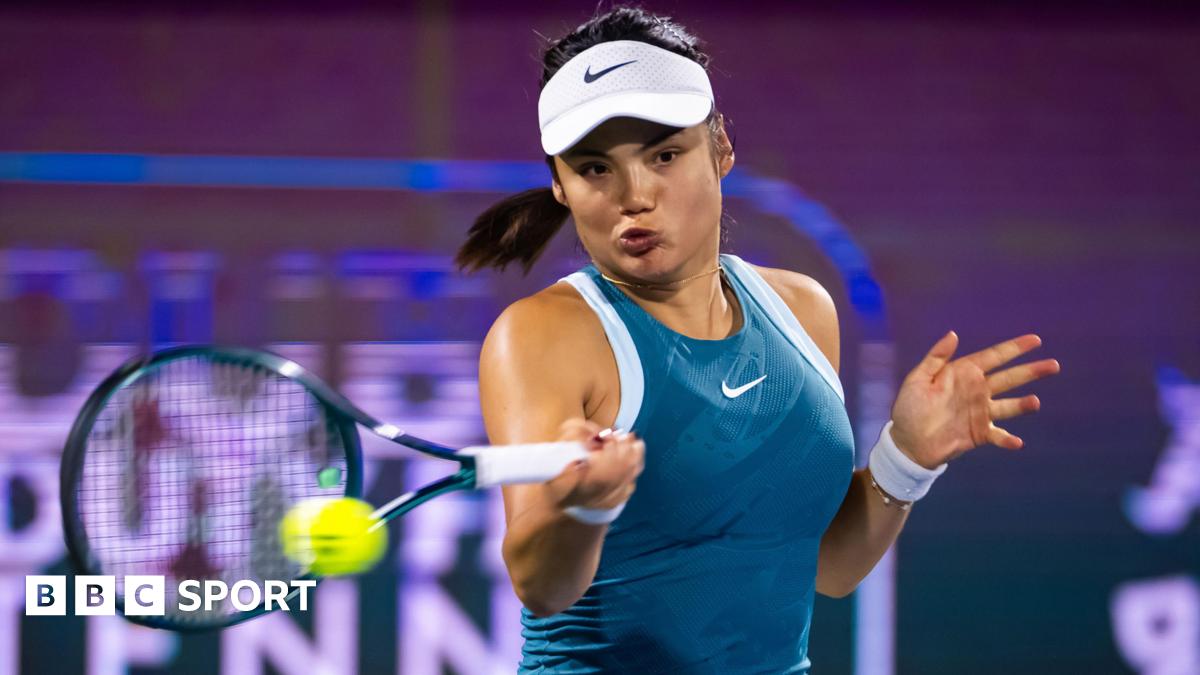
Coach Vladimir Platenik says his very brief partnership with Emma Raducanu ended because the Briton "was feeling stressed and under a lot of pressure".
Platenik told BBC Sport he was "absolutely surprised" but "not angry" when the 22-year-old called off the arrangement after only two weeks.
The conversation took place after 10 days of training and on the eve of the British number two's first-round match at the Miami Open on Wednesday.
"I totally understand Emma, she's not in an easy position. The world is looking at her after the US Open [which she won in 2021] and everybody is expecting - including herself - what she is going to do next," Platenik said.
"So for me it's absolutely understandable that she's under a lot of pressure. She told me she was feeling stressed.
"There are no hard feelings from my side. She finished the relationship in a fair way, maybe too quickly, but this is tennis, this is sport. We need to respect that.
"She was not feeling OK, and that was her decision. I didn't want to go into deeper communication about that. I think the player needs to feel good, and the player needs to make a decision. Sometimes you make a good decision, and sometimes bad."
Platenik said Raducanu's father Ian, with whom he exchanges messages from time to time, asked him at the end of last month whether he could recommend a coach.
His daughter had been without a permanent coach since Nick Cavaday stood down for health reasons in January.
Platenik explained that he initially suggested someone else's name, but was soon back in touch when his partnership with New Zealander Lulu Sun came to an unanticipated end.
The 49-year-old Slovak promptly boarded a flight to Indian Wells and arrived on site a day before Raducanu's defeat by Moyuka Uchijima of Japan, and said he was "surprised by the way Emma was working."
"She was not really able to stay in the rallies, there were a lot of problems to play on the move with the different speed, different spin and different angle," he said.
"We had a good discussion, the communication was good from her side. I was very happy because I really must say that I never had a player improving that fast - in eight, nine days.
"She was getting a lot of things very fast. And I think it also showed in the first round [victory over Sayaka Ishii in Miami]. She was playing very correct, technically and tactically - exactly what we were practising, so I'm happy and I hope that she could take something out of my help."
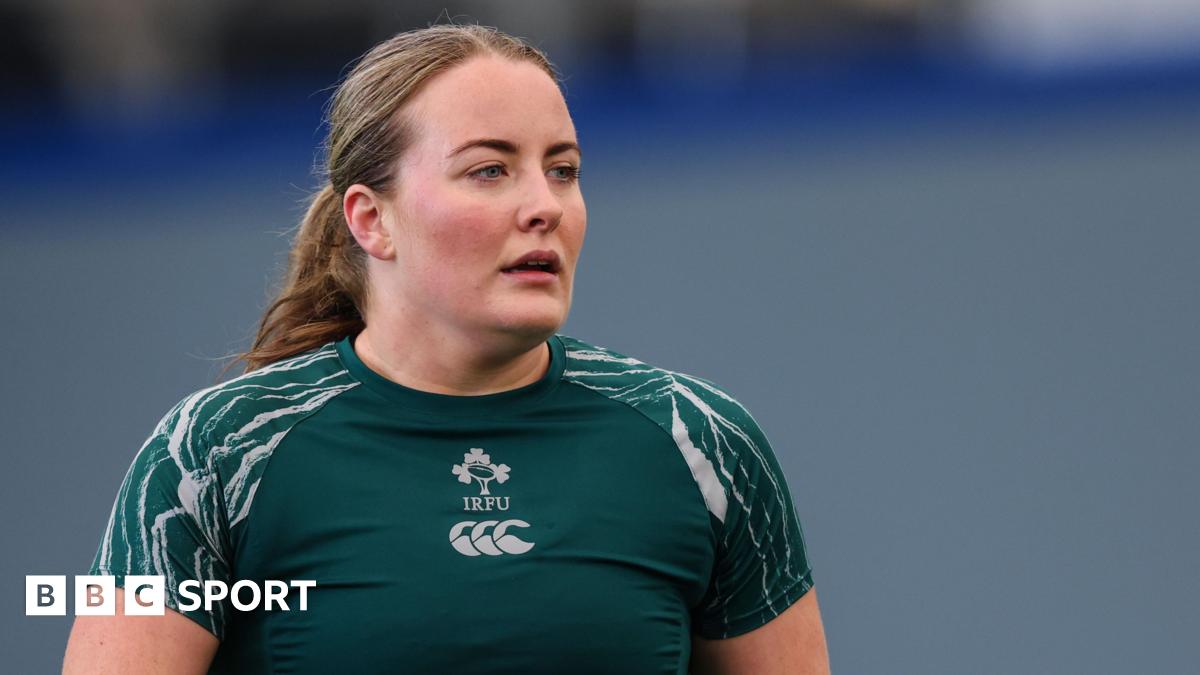
Forward Fiona Tuite says Ireland can "100%" defeat France in their Women's Six Nations opener in Belfast on Saturday.
France have finished second to all-conquering England in the last five Six Nations and missed out on last year's title after a final game defeat by the Red Roses.
Ireland, who finished third last year, last defeated the French in 2017 championship.
"We 100% believe we can win this game," said Ulster second row Tuite.
"We'll focus on ourselves and we'll take a lot from it, it's not all about the result.
"We're really focused on this being a journey and on ourselves. If the result comes, then absolutely, it's class. But do we think we can punch? Absolutely."
The 28-year-old has been named amongst the replacements alongside Cliodhna Moloney and squad captain Eden McMahon with head coach Scott Bemand opting for a 6:2 split on his bench.
Under Bemand, Ireland have qualified for this summer's World Cup and recorded famous victories over Australia and New Zealand last autumn.
Tuite said the step up in "physicality and aggression" were the main differences in playing the best teams in the world, and that is where Ireland would look to take a further step.
"We're not the biggest team but we're definitely aggressive. I think Hugh [Hogan, defence coach] calls us a middleweight team, where we have to punch hard and low.
"That's something we have been focusing on, that Irish physical dominance is something we wanted to bring into the game.
"We're really looking forward to bringing that against the French."
Tuite added France are a "tough team" and said Ireland had been building in training, becoming more "intense and competitive" as the weeks have progressed.
"They are fast, strong and quick. We've worked really hard but we will just focus on the game that we can bring, and we're looking forward to the challenge.
"We're looking forward to see how we go in the Six Nations and then on to the World Cup."
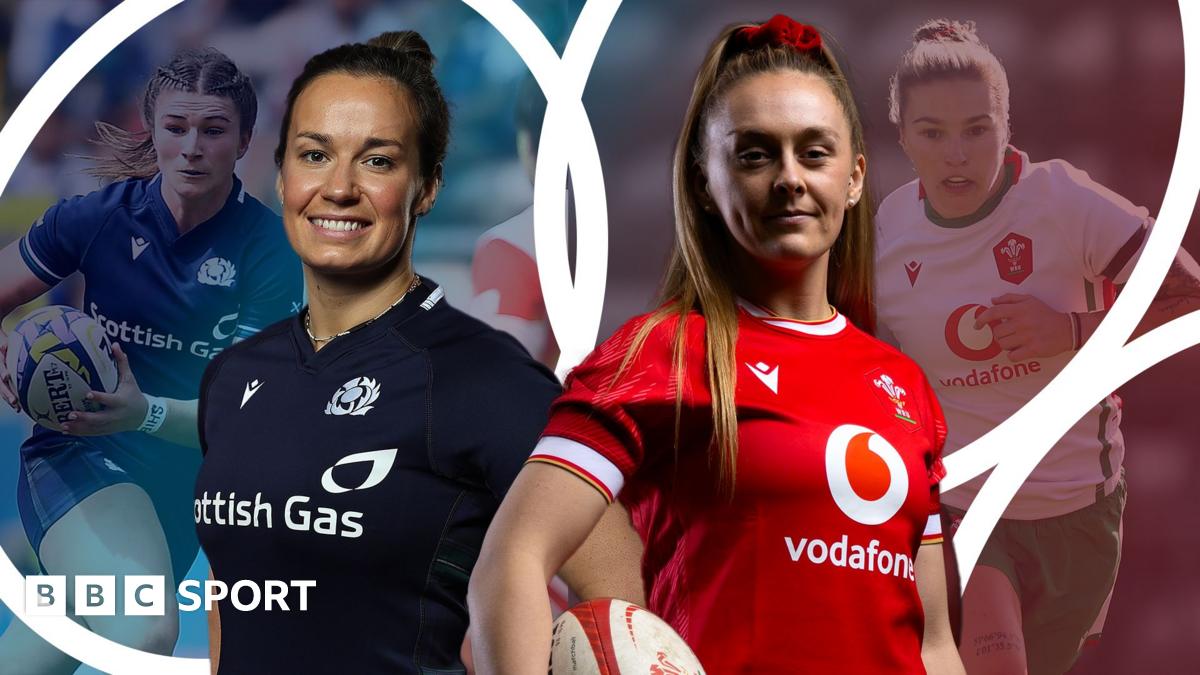
Scotland head coach Bryan Easson: "They are a familiar enemy, it's always tasty and they are always close games and games that we really enjoy.
"Two styles that are a little bit different, it can be quite physical, it can also be a really good tactical battle as well.
"We know that Sean coming in is going to have a different edge with the experience he's had a Gloucester-Hartpury, with a winning team as well, a winning mentality. That will be interesting just to see how that goes.
"We're really looking forward to it, we've done more analysis on Gloucester-Hartpury than we have on Wales because obviously that's a potential style.
"We're aware of the battle that's going to come. It's been close over the last few years and we're expecting nothing else."
Wales head coach Sean Lynn: "The big thing is we all care and going up to Scotland, I want us to make the family proud.
"It will be very competitive and I know some of the players from the PWR - they're a good outfit but we are too and that's what I'm really excited about.
"There is some great talent and work ethic in our players.
"I've got full trust in these girls and I'm very confident we can go up there and really have a go at Scotland.
"You look at Scotland's 10 and 12 - they play a very big territorial game. They are very physical, their forward pack are very well drilled but that's what these girls are getting really excited about, facing a good challenge."
Why England's 'warrior queen' is the perfect captain
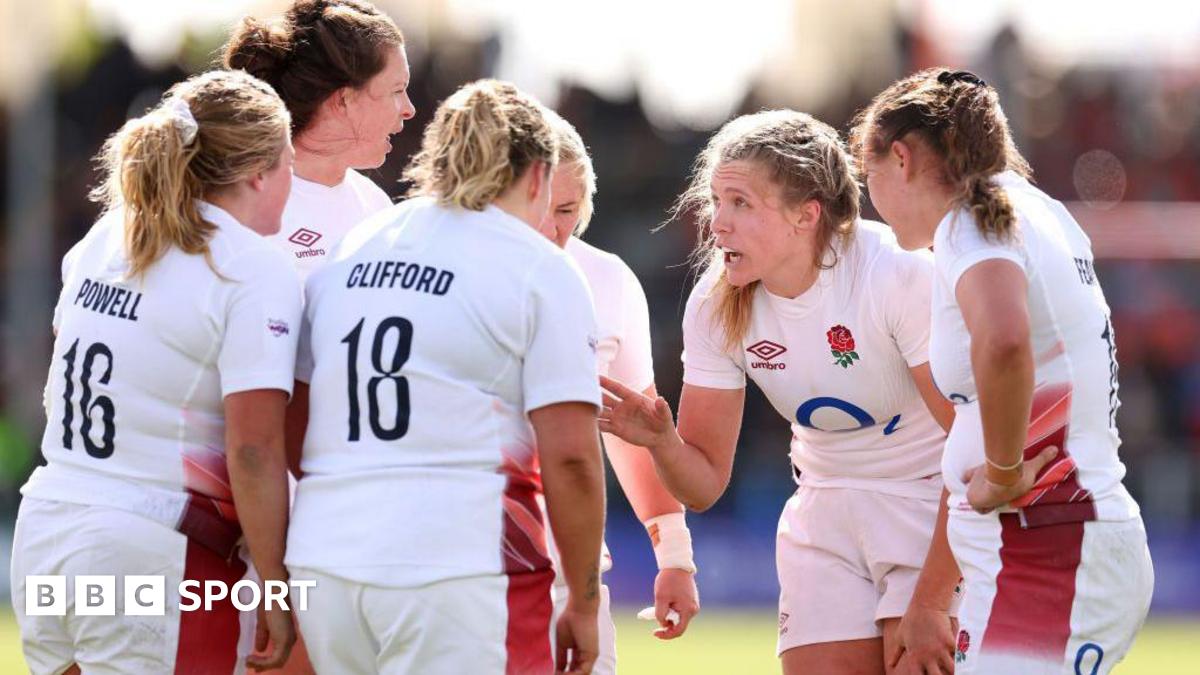
Aldcroft had huge desire and determination and, to further her rugby ambitions, moved from the family home in the north-east to the south-west to study and take part in a full-time rugby programme at Hartpury College.
"Moving away was a huge decision," Aldcroft said. "The first week I hated it. I didn't realise I would be so homesick but it was the best two years I have ever experienced.
"I hoped one day I would be able to play for England, so I concentrated on that dream."
Sean Lynn, now head coach of Wales women, first encountered a 16-year-old Aldcroft when he was teaching at Hartpury.
It was not long before he had a conversation with Red Rose head coach Simon Middleton about a player he "can't fault".
"'She's not going to be a leader by her outspoken words, this girl will lead by example'," said Lynn, who became head coach of Gloucester-Hartpury in 2020.
"On and off the pitch, she is just a professional individual.
"She is that warrior queen but what I love about her is she demands high standards in training."
Aldcroft signed for Darlington Mowden Park Shark in 2015, representing England under-20s for two years before making an instant impact on her senior England debut in November 2016.
Coming on in the closing stages against then Six Nations champions France, she scored the winning try in a 17-13 victory.
Next year she signed for Gloucester-Hartpury and in 2018 was named co-captain with Natasha Hunt, while establishing herself in the England squad.
"Once you get a little taste of it you just want more," she said. "I am just so hungry to keep developing with the teams."

MONTEREY, Calif. Friends of Laguna Seca officials announced Mel Harder has been named president and general manager of WeatherTech Raceway Laguna Seca.
Harder brings three decades of motorsports experience to his new role after most recently serving as team manager at Chip Ganassi Racing.
His previous positions include senior vice president and general manager of Circuit of The Americas and senior vice president of the Indianapolis Motor Speedway.
Harders experience provides him with an extensive background in hosting international, world-class events and facility management.
Our board and team are very enthusiastic about having Mel join us and his background makes him uniquely qualified to strengthen our efforts at WeatherTech Raceway and Laguna Seca Recreation Area, said Lauri Eberhart, CEO of Friends of Laguna Seca. His insight and operational expertise will play a pivotal role in facilitating our long-term commitment to the local and motorsports communities, our partners and dedicated fans, and our efforts to revitalize Laguna Seca for generations to come.
Harder will collaborate closely with Eberhart and the entire raceway team to implement Friends business model designed to enhance operational performance and develop new experiences and services for guests, motorsports series, and partners.
The vision of Friends of Laguna Seca fuels the passion and energy needed to drive this venue forward, and Im thrilled to bring my experience and enthusiasm for the world of motorsports to help lead the team, Harder said. I look forward to collaborating with our partners and the entire community to create unforgettable experiences as we continue the legacy of WeatherTech Raceway Laguna Seca as a world-class entertainment destination.















 Phone: (800) 737. 6040
Phone: (800) 737. 6040 Fax: (800) 825 5558
Fax: (800) 825 5558 Website:
Website:  Email:
Email: 






